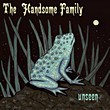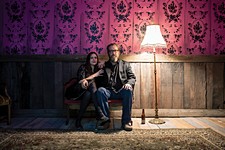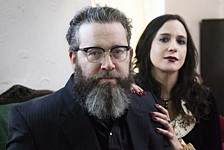
 US - New Mexico - Full Moon 248 - 11/14/16
US - New Mexico - Full Moon 248 - 11/14/16
The Handsome Family
Personal Zeitgeist - an interview with Brett and Rennie Sparks
For years, the husband and wife team of Brett and Rennie Sparks seemed to be destined to be under the radar forever. The critics loved the dark Americana mood of most of the recorded output
and they built a small, loyal following, but they never aimed at global success. Then fate came knocking in the form of a theme song for a popular TV show. "Far From Any Road" became the
opening song of True Detective and brought on the kind of exposure a band very rarely gets two decades into its career. Yet on their newly released album Unseen, their tenth,
The Handsome Family leaves behind their trademark Country noir style and the murder ballads - and explained the reasons why when the talked to Luna Kafé from their home in Albuquerque,
New Mexico. "We were just sitting outside on our patio-there is a faint hint of Fall in the air", says Brett, and Rennie adds: "They are roasting green chile in the parking lots. That's
the smell of Autumn in New Mexico!"
Luna Kafé: To start off with something general: What's it like be the Handsome Family in the year 2016 (and what's the biggest difference to, say, around the time you released
your first album a couple of decades ago)?
Brett: Artistically, I feel like we've "found our voice." Personally, I struggled for many years to figure out what I was doing stylistically. I feel much clearer about that now.
I don't question myself as much. Although I still love roots music, I don't feel obligated to write in that style exclusively. I let the song and lyrics tell me what path to take. From a
business standpoint, things could not be more different now than when we released Odessa in 1993. Back in the 90s, you'd release a record and you could depend on selling a few thousand
copies. You might get lucky and sell 10,000 or more - and that would translate into real money. So there was "hope." But these days very few people are getting paid a living wage because of
streaming and free music on the internet. A million streams sounds like a pretty big number. To put it in perspective, our song "Weightless Again", one of our most popular songs, currently
has 1 million spotify streams. But 1 million streams equals only about $5,000. After you split that with your label (who owns your masters) you are left with $2,500. That will barely pay your
bills for a few months. That won't even cover your plane tickets to start a tour. This is not a very hopeful environment for young musicians.

Luna Kafé: Can you sum up the Handsome Family in just three words?
Brett: Romantic Western Gothic.
Luna Kafé: To get the most obvious question out of the way early on: Being recognized (by many) for a single song is both a blessing and a curse, I guess. So what are the
good (and maybe bad?) things that the True Detective exposure for your song "Far From Any Road" has brought on?
Brett: Well, I could write a book about this. Yes, this kind of "one-hit wonder" success cuts both ways. It's great to suddenly reach millions of people; very gratifying. But "huge
overnight success" is not really as huge as people assume it is. Break it down - out of millions of streams (Spotify, YouTube, etc.) we gained about about 30,000 new fans (judging by Facebook,
Twitter, iTunes, etc). Out of those, many of these people are there solely on account of "Far From Any Road" - many these will quickly fall away after they go to Spotify and discover that
not all of our music sounds identical to that song. So... you are left with maybe 15k new fans. Of these maybe 10k will like the band's oeuvre enough to actually buy an album or a ticket to
a show. So that's maybe 10,000 new fans, or "supporters" as I like to fondly think of these angels. So you end up selling maybe 10,000 records off the back of that big hit - the same number
I cited above! One critical difference: in the "old days" you didn't have to have a global smash hit, a TV theme, to sell 10k records. It was normal and common.
Luna Kafé: I suppose that show and your music were an easy match though. What's the most unlikely place your music has turned up or has been brought up?
Rennie: When our season of True Detective was at its height, our theme song got played at a lot of sporting events. Very strange!

Luna Kafé: What do you consider the most important factor when recording your new album Unseen? Anything that sets it apart from what you've done before?
Brett: I was given a piano by a friend. This opened up a world of new possibilities. Piano was my first instrument; I started playing when I was very young. After getting the piano,
I started relearning the music I played in my 20s - especially Bach and Chopin. A great deal of the music for Unseen was written on the piano. When you are accustomed to writing on
guitar, switching to piano really spreads things out in front of you in a different way. Also for this record I bought some new mics - ribbons, a couple of Neumanns etc. I also bought a nice
outboard compressor, an 1176. This improved the signals going "into the box." We also did live drums. Jason Toth flew out to Albuquerque and we spent a week getting the drums just right. I
did a lost of research, reading, and experimenting to get the drum sound right. I think these are the best drum sounds I have ever captured.
Luna Kafé: If I were to say that on Unseen the melodies have gotten (even) prettier and the instrumentation (even) more adventurous - could you agree?
Brett: I would be very flattered and appreciative. During the year I was writing Unseen I was listening primarily to Classical music - Bach, Brahms, Chopin, Schubert, etc. This
may have had a positive influence. This wasn't intentional, I didn't want to write classical music, this music just sounded good to me at the time. I'm sure this music filtered through and
flavored my usual genre preferences -country, pop, folk, etc.
Luna Kafé: Even though you've obviously grown over the years, I guess you have always stayed true to your roots as well. So I was wondering: How do you approach a new
record ten albums in with that in mind? Do you map out a slightly different sound or approach before you start or are the changes more casual?
Brett: I think all our records have some kind of personal Zeitgeist. It usually starts to possess us right from the start of the writing and gets stronger as the work becomes
more focused. For instance a common theme may develop in the lyrics Rennie is writing. Or the musical place I'm in. As you might remember, I was really under the thrall of J.S. Bach last year
(I even went to Leipzig!). I was obsessed! This was a huge influence, perhaps not always directly, but a powerful force nonetheless. I also got that piano, so I was playing a lot of Bach as
well. I thought a lot about the way Bach integrates melodic line into harmony; the two are inseparable. In contrast, a lot of modern pop is like early classical music - you have a catchy melody
on top and a simple chordal accompaniment (think early opera). I wanted to get a little bit past that. I wanted counterpoint.
Luna Kafé: Your songs have always sounded very effortless to me. Does it really come that easy to you to write and play in this kind of style or is there a lot of work
involved to get to this point?
Brett: Some are effortless. I think I wrote the draft of "Gold" in 15 minutes. Some are not. I worked on "The Red Door" for months. First to get the proper "style" or vibe. Then the
structure - this was a struggle. How to deal with the choruses, how to make lyric lines fit, etc. Then comes the infinite questions that arise in arranging and recording.
Luna Kafé: As the album title suggests, you're shining a light on thing often unseen on this album. I guess the idea is not entirely new to you, but why did you focus on
it this time and how did you find the topics and subjects you're covering?
Rennie: There are a lot of colors floating around in the record, but gradually all the songs were leaning towards the disappearance of things. I usually find the title somewhere in the
lyrics after we're finished writing and this time it is the song "Gentlemen" where all the brightest light is barely visible.
Luna Kafé: What is (still) attracting you to the old tales and especially the old folk songs?
Brett: At the moment I'm not really interested in this. It's a fascinating subject, but not the only subject. Like murder ballads - I don't really feel the need to write another murder
ballad; it's been done to death. I'm sure I will return to folk music, but for now I'm taking a break. It will be fine without me.
Rennie: I like stories.
Luna Kafé: What is making you the happiest right now as musicians?
Brett: Happiness was never my goal as a musician. Maybe fulfillment or "balance" is a better word. When I accomplish a musical goal, I feel fulfilled. But then again, I never completely
feel that I accomplish my musical goals. You don't finish a record - you abandon it. Perhaps that's what keeps me working, trying to get closer to balance. Sometimes I wish I had become a
scientist - the goals are much more tangible, quantifiable. Perhaps that's why I enjoy recording more than anything else in the musical realm. It has a more clearly defined logic.
Luna Kafé: Silly last question: Any famous last words, anything you'd like to see in print that I completely missed out on?
Rennie: The octopus has three hearts. Mysteries surround us at every turn.
Copyright © 2016 Carsten Wohlfeld 
|


